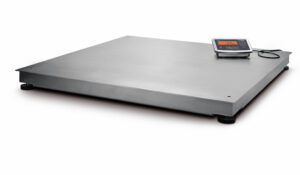
This article deals with different criteria when selecting a scale for different static industrial weighing.
This article deals with different criteria when selecting a scale for different static industrial weighing. Industrial scales contribute sustainably to the logistics and process chain. Considering the wide range of different scales, finding a reliable solution that seamlessly integrates into an existing production process is crucial. Looking for this solution will involve both requirements on the equipment, like the weighing range, the resolution of the repeatability of results, and the physical characteristics like the material constituting the build of your scale. External factors like environmental conditions such as extreme temperature or process requirements also can place additional requirements on industrial scales. So that the scale could communicate continuously with other equipment, selecting the proper interface is essential. Read on for a helpful weighing platform guide!
Areas of Application for the Industrial Scale
This scale could be used to classify items based on pre-programmed user-defined criteria. Since every unit is checked, any over- or under-filled packages can be controlled centrally. For any process optimization, short and long-term production performance could be measured. Routine check-weighing procedures can seamlessly integrate into complex or straightforward Statistical Process Control systems. These can then be used to conduct data analysis effortlessly or adjust the filling heads during real-time weighing.
Batch weighing scales are designed with load cells, weighing platform, pipes, valves, electrical hardware, and process control software within an integrated control system. This system controls one or various feed systems, which can convey the different user-defined quantities of raw materials in a standard receiving vessel where the contents are mixed and made to react. As a rule, the receiving vessel is tared each time a new component is added. The system can also be set up to measure the weight loss within individual ingredient vessels. Batch weighing scales are supplied in automatic and manual versions. Some batch weighing systems can also control other parameters involved with the processes, such as heating, mixing, and cooling.
Picking the Materials for Construction
In easy terms, the scale can be classified into two basic categories: essential scales and scales subject to harsh environmental demands. Basic scales are created with standard materials, including plastic, aluminum alloy, and painted and galvanized carbon steel. Typically, these scales are used for weighing processes in different areas like logistics or warehouses, considering where the ambient conditions are drier, and hygiene and corrosion resistance aren’t important factors. In environments that usually require a high level of chemical compatibility, stainless steels or the AISI-304 and AISI-316 grades are some of the most commonly used materials.
To learn more about weighing platforms and scales, visit Scale People today!
CONTACT THE SCALE PEOPLE FOR WEIGHING EQUIPMENT AND CALIBRATION SERVICES!
Since 1956, The Scale People have earned a reputation as the best service provider for calibrating and repairing weighing equipment in the mid-Atlantic area. Our sales team can help you to find the best weighing equipment for your application. We currently have offices in Columbia, MD, and Newport News, VA, but we offer our services nationwide. Over the years, we have built many satisfied clients from various industries, including pharmaceutical, food and beverage, and government manufacturing. We are a fully ISO/IEC 17025:2017 accredited service company offering calibration for balances, scales, dynamometers, force measurements, test weights, pipettes, and more. All our services have a 100% satisfaction guarantee. We’re only a phone call away at +1 (800) 451-9593. Follow us on Facebook, Twitter, and LinkedIn to learn more about our work.
